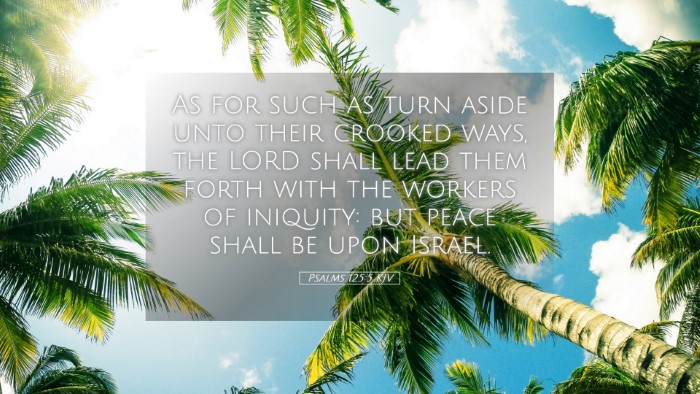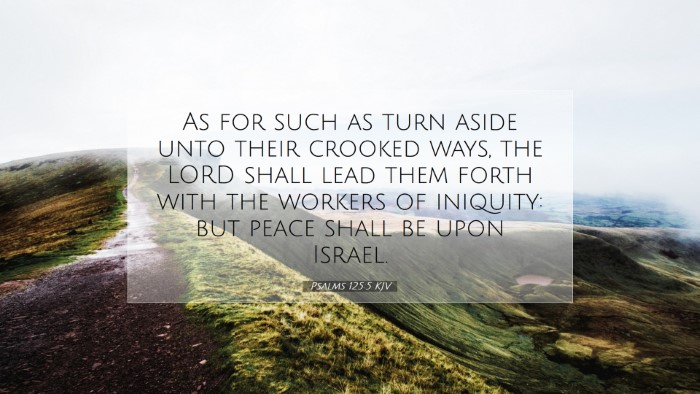Psalms 125:5 Commentary
Psalms 125:5 (KJV): "As for such as turn aside unto their crooked ways, the Lord shall lead them forth with the workers of iniquity: but peace shall be upon Israel."
Introduction
This verse stands at the conclusion of Psalm 125, which emphasizes the stability and security of those who trust in the Lord as well as the fate of the wicked. By examining the insights from renowned commentators, we can deepen our understanding of the text's theological implications and moral lessons.
Contextual Overview
The psalmist begins with a declaration about the stability of Mount Zion, symbolizing the enduring presence of God with His people. The concluding verse warns about the consequences of turning away from God’s ways, highlighting the dichotomy between the destiny of the righteous and the wicked.
Commentary Insights
Matthew Henry's Commentary
Matthew Henry emphasizes the contrast between the fate of the righteous and the wicked. He notes:
- Judgment for the Wicked: Those who “turn aside unto their crooked ways” are those who deviate from God’s path, engaging in deceit and iniquity. Henry suggests that such individuals will ultimately face divine judgment alongside other workers of iniquity.
- Consequences of Sin: The phrase “the Lord shall lead them forth” suggests a leading into judgment. God does not abandon the wicked but rather directs them along a path to their eventual punishment.
- Peace for the Righteous: In contrast, peace is promised to Israel, signifying God’s blessing upon His faithful ones, who remain steadfast in their trust in Him.
Albert Barnes' Commentary
Albert Barnes provides a detailed examination of the text that focuses on the behavioral aspects of God and humanity:
- Human Responsibility: Barnes writes that the condition of the wicked is a result of their own choices. They “turn aside” from God’s commands, and this decision leads them toward destruction.
- Divine Justice: The assurance that “peace shall be upon Israel” is not merely a passive state but an active blessing from God. Barnes intertwines this thought with the reality that the ultimate fate of sinners is divine retribution, reinforcing the theme of justice.
Adam Clarke's Commentary
Adam Clarke offers a contextual and thematic interpretation:
- The Paths of the Wicked: Clarke explains that the “crooked ways” refer to moral and spiritual corruption. He points out that those who stray from God’s righteous path will find themselves aligned with evil doers.
- God’s Faithfulness: Clarke also reflects on the steadfast nature of God’s covenant people. Even in the midst of judgment pronounced on the wicked, the psalmist reassures the faithful of their peace and security.
Theological Implications
The overarching themes drawn from Psalms 125:5 include:
- The Nature of God’s Justice: The verse vividly encapsulates the concept of divine justice, serving as a reminder that neglecting God’s ways carries grave consequences.
- The Assurance of Peace: For believers, the promise of peace signifies a profound inner assurance derived from faithfulness to God’s commands, in stark contrast to the fate of the wicked.
- Call to Obedience: This psalm serves as a call for individuals to remain vigilant and steadfast in their faith, avoiding the temptations that lead to “crooked ways.”
Conclusion
Psalms 125:5 stands not only as a warning but also as a source of comfort for God’s people. With its dual message about the fate of the righteous and the wicked, this verse encourages a life rooted in faithfulness and obedience. Commentators such as Matthew Henry, Albert Barnes, and Adam Clarke provide rich insights, reminding us of the profound theological truths encapsulated within this brief yet impactful scripture. Pastors, students, theologians, and scholars alike can draw upon these interpretations to reinforce their understanding of God’s justice and covenant faithfulness.


